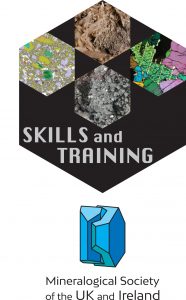
The Society offers a monthly series of Skills and Training events.
Register here for an upcoming event (4th February 2026): The Brilliance of Defects – The Mineralogical and Petrological Significance of Luminescence in Minerals by Adrian Finch (St. Andrews)
Luminescence of minerals contains information about the structural state of metals and defects at ultradilute concentrations. In principle, the light emitted is a powerful tool for determining defect structure, but interpreting such data is challenging since we have an incomplete understanding of luminescence in many minerals, and how features such as coordination state and symmetry are encoded within it. This short course will explore what information can be extracted from luminescence in mineral systems, beginning with the mineral physics behind the process, but moving onto the geological information that one can obtain. The course explores both the uses of both luminescence spectroscopy and petrography.
Register here for an upcoming event (21st April 2026): An introduction to Single Crystal X-ray and Electron diffraction techniques by Robert Bannister, Daniel Rainer and Peter Horton (UK National Crystallography Centre, University of Southampton).
Determining the atomic arrangement within crystalline materials is fundamental to understanding their properties and behaviour. Single-crystal X-ray diffraction (SCXRD) has long been the gold standard for precise structure determination, offering detailed insights into symmetry and coordination environments. However, the main barrier to the use of SCXRD as a technique is the ability to grow suitably sized crystals of sufficient quality. Due to the significantly increased interaction between electrons and matter, when compared with X-rays, electron diffraction (3DED) allows us to study crystals magnitudes smaller than SCXRD experiments. This enables structure solution from nanocrystalline materials. Together, these methods provide a powerful set of techniques for resolving complex structures, but each comes with its own challenges in data collection, interpretation, and refinement. In this talk we will begin with discussing routine SCXRD experiments and then explore 3DED, in both instances looking at sample preparation, through data collection and into structure solution.
Recordings of some of the presentations will be posted here after the event. See the links below.